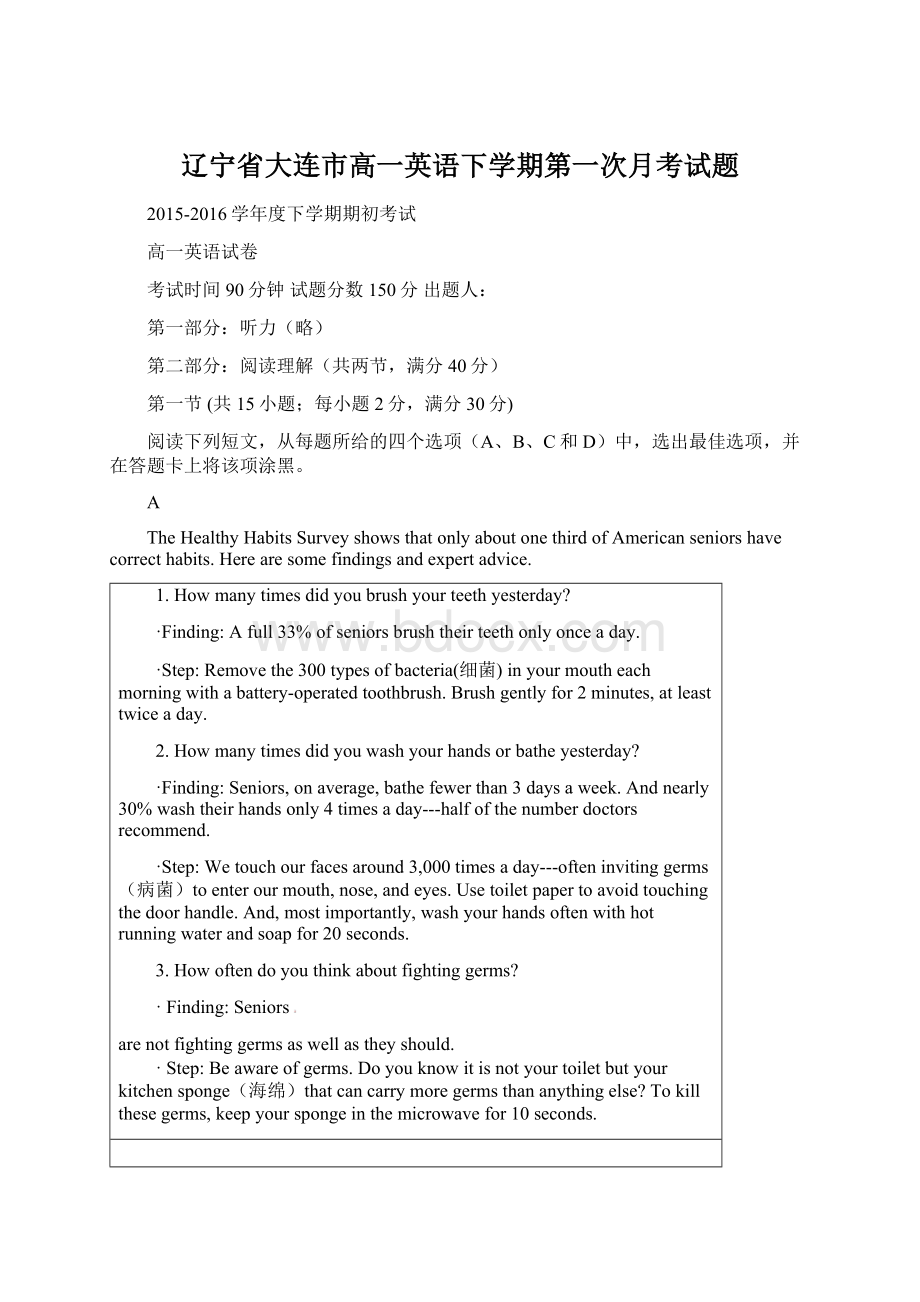辽宁省大连市高一英语下学期第一次月考试题.docx
《辽宁省大连市高一英语下学期第一次月考试题.docx》由会员分享,可在线阅读,更多相关《辽宁省大连市高一英语下学期第一次月考试题.docx(10页珍藏版)》请在冰豆网上搜索。

辽宁省大连市高一英语下学期第一次月考试题
2015-2016学年度下学期期初考试
高一英语试卷
考试时间90分钟试题分数150分出题人:
第一部分:
听力(略)
第二部分:
阅读理解(共两节,满分40分)
第一节(共15小题;每小题2分,满分30分)
阅读下列短文,从每题所给的四个选项(A、B、C和D)中,选出最佳选项,并在答题卡上将该项涂黑。
A
TheHealthyHabitsSurveyshowsthatonlyaboutonethirdofAmericanseniorshavecorrecthabits.Herearesomefindingsandexpertadvice.
1.Howmanytimesdidyoubrushyourteethyesterday?
·Finding:
Afull33%ofseniorsbrushtheirteethonlyonceaday.
·Step:
Removethe300typesofbacteria(细菌)inyourmoutheachmorningwithabattery-operatedtoothbrush.Brushgentlyfor2minutes,atleasttwiceaday.
2.Howmanytimesdidyouwashyourhandsorbatheyesterday?
·Finding:
Seniors,onaverage,bathefewerthan3daysaweek.Andnearly30%washtheirhandsonly4timesaday---halfofthenumberdoctorsrecommend.
·Step:
Wetouchourfacesaround3,000timesaday---ofteninvitinggerms(病菌)toenterourmouth,nose,andeyes.Usetoiletpapertoavoidtouchingthedoorhandle.And,mostimportantly,washyourhandsoftenwithhotrunningwaterandsoapfor20seconds.
3.Howoftendoyouthinkaboutfightinggerms?
·Finding:
Seniors
arenotfightinggermsaswellastheyshould.
·Step:
Beawareofgerms.Doyouknowitisnotyourtoiletbutyourkitchensponge(海绵)thatcancarrymoregermsthananythingelse?
Tokillthesegerms,keepyourspongeinthemicrowavefor10seconds.
21.WhatisfoundoutaboutAmericanseniors?
A.Mostofthemhavegoodhabits.
B.Nearly30%ofthembathethreedaysaweek.
C.Allofthemarefightinggermsbetterthanexpected.
D.Aboutonethirdofthembrushtheirteethonlyonceaday
22.Doctorssuggestthatpeopleshouldwashtheirhands.
A.fourtimesaday
B.threetimesaday
C.eighttimesaday
D.twiceaday
23.Whichofthefollowingistrueaccordingtothetext?
A.Weshouldkeepfromtouchingourfaces.
B.Therearelessthan300typesofbacteriainthemouth.
C.Akitchenspongecancarrymoregermsthanatoilet.
D.Weshouldwashourhandsbeforetouchingadoorhandle.
24.Thetextprobablycomesfrom.
A.aguidebookB.apopularmagazine
C.abookreviewD.anofficialdocument
B
Atthirteen,Iwasdiagnosed(诊断)withkindofattentiondisorder.Itmadeschooldifficultforme.Wheneveryoneelseintheclasswasfocusingont
asks,Icouldnot.
Inmyfirstliteratureclass,Mrs.Smithaskedustoreadastoryandthenwriteonit,allwithin45minutes.Iraisedmyhandrightawayandsaid,“Mrs.Smith,yousee,thedoctorsaidIhaveattentionproblems.Imightnotbeabletodoit.”
Sheglanceddownatmethroughherglasses,“youarenodifferentfromyourclassmates,youngman.”
Itried,butIdidn’tfinishthereadingwhenthebellrang.Ihadtotakeithome.
Inthequietnessofmybedroom,thestorysuddenlyallbecamecleartome.Itwasaboutablindperson,LouisBraille.Helivedinatimewhentheblindcouldn’tgetmucheducation.ButLouisdidn’tgiveup.Instead,heinventedareadingsystemofraiseddots(点),whichopenedupawholenewworldofknowledgetotheblind.
Wasn’tIthe“blind”inmyclass,beingmadetolearnlikethe“sighted”students?
Mythoughtsspilledoutandmypenstartedtodance.Icompletedthetaskwithin40minutes.Indeed,Iwasnodifferentfromothers;Ijustneededaquieterplace.IfLouiscouldfindhiswayoutofhisproblems,whyshouldIevergiveup?
Ididn’texp
ectanythingwhenIhandedinmypapertoMrs.Smith,soitwasquiteasurprisewhenitcamebacktomethenextdaywithan“A”onit.Atthebottomofthepaperwerethesewords:
“Seewhatyoucandowhenyoukeeptrying?
”
25.Theauthordidn’tfinishthereadinginclassbecause.
A.Hewasnewtotheclass
B.Hew
astiredofliterature
C.Hehadanattentiondisorder
D.Hewantedtotakethetaskhome
26.WhatdoweknowaboutLouisBraillefromthepassage?
A.Hemadeagreatinvention
B.Hehadgoodsight
C.Hegaveupreading
D.Helearnedalotfromschool
27.WhatwasMrs.Smith’sattitudetotheauthorattheendofthestory?
A.AngryB.ImpatientC.SympatheticD.Encouraging
28.Whatisthemainideaofthepassage?
A.Thedisabledshouldbetreatedwithrespect.
B.Ateachercanopenupanewworldtostudents.
C.Everyoneneedsahandwhenfacedwithchallenges.
D.Onecanfindhiswayoutofdifficultieswithefforts.
C
ItiswellknownthattheJapanesepeople’sloveoffishisalmostasabee’sinterestinhoney.Asfishpopulationsweredecreasing,fishingcompanieswereforcedtofishfurtherandfurtherawayfromtheshore.Thentheyhadabigchallenge(挑战)-howtokeepthefishfreshforlonger.Sotheydecidedtokeepthefishstoredinfreezersontheboats.Butthepublicdidnotlikef
rozenfish.Soagainthefishingcompanieshadanewbiggerchallenge.Whattheydecidedtodowastohavefishtanksontheirboats.Aftercatchingfishes,theywouldputtheminthetanksandkeepthemlivingthereuntiltheygotbacktoshore.Butinthisprotectedenvironment,lackingpredators(掠食者),thefishstoppedmovingaround.TheJapanesepublicfeltthesedullfishdidnottastefresh,whichhadanunpleasanteffectuponsales.Onceagainthefishingcompanieshadanevenbiggerchallenge.
Stopforaminute!
Beforewegoanyfurther,Iwouldliketoask“Whatareyourchallenges?
Howdoyouhandleanunexpectedchallenge?
”MayIthinkitthiswaythatyoushouldtrytoattackyourchallenges?
Conquer(战胜)themwithaSwissArmyknife.Takethemostproperandsimpletoolthatyoucanadopttodealwithyoursituation.
Nowbacktoourstory.HowdidtheJapanesefinallyfigureoutthefreshfishproblem?
Sharks!
Youmightthinkthesame.Sharkswerecaughtandputintothetankswithotherfishes.Don’tsharkseatfish?
Well,theydoeatafewfish,buttheydidalsokeepmorefishactiveandalert(警觉的).Thefishstayfreshbecausetheyarechallenged.
Now,trytokeepyourselffreshbyfindingyourownsharktoofferyourselfachallengeinyourownbusinessandcareer.
29.Themainreasonforthefishingcompanytofishinthefarseawasthat.
A.thefishesfartherawayfromtheseatastedfresher
B.thefishresourceneartheshorewasonthedecrease
C.peoplewouldprefereatingfreshfishestolessfreshones
D.itwasgettingharderandhardertokeepfishesfresh
30.Whichofthefollowingstatementsistrue?
A.Thefishkeptintanksdidn’tsellwellbecauseoftheirtaste.
B.Japanesepeoplelovehoneyasmuchasabeedoes.
C.Thefishstoredintheprotectedenvironmenttastedthebest.
D.Thefishkeptintanksdidn’ttastefreshbecausetheydiedbeforereachingtherestaurant.
31.Theunderlinedpartofthelastparagraphmeans“.”
A.Sharksareusuallycomparedtothechallengesinpeople’slife
B.Trytofindabigsharkandyouwillmeetyourchallenge
C.Ifyouwentfishing,youmightdoasthefishingcompaniesdid
D.Tosucceedinlife,youshouldalwaysbereadytomeetchallenges
D
ManyWesternpeoplearenotusedtosittingontheflooranymore.InJapan,however,sittinguprightontheflooriscommonindifferentsituations.Forexample,mealsaretraditionallyhadwhenpeoplesitonthetatami(榻榻米)flooraroundalowtable.Alsoduringtheteaceremonyandother
traditionalevents,onesitsonthefloor.
Theformalwayofsittingforbothmenandwomeniskneelingupright.Peoplewhoarenotusedtosittinginthisstylemayfeeluncomfortableafterafewminutes,andtheirlegsmaygonumb.However,foreignersarenotusuallyexpectedtobeabletositinthisstyleforalongtime,andanincreasingnumberofJapanesepeoplethemselvesaren’tabletodoso,owingtoamorewesternizedlifestyle.
Inothersituations,menusuallysitcross-legged,whilewomensitontheirkneeslayingbothlegstooneside.Theformersittingstyleisconsideredwhollymale,whilethelatterisconsideredcompletelyfemale.
Themostimportantguestsitsonthehonoredseatwhichissetfarthestfromtheentrance.Ifthereisatokonoma(壁龛)intheroom,theguestshouldbeseatedinfrontofit.Thehostortheleastimportantpersonissupposedtositnexttotheentrance.Ofcourse,thereareotherthingstobeconsideredineachparticularcase.
32.WhichofthefollowingsituationsisNOTmentionedinthepassage?
A.Whentraditionaleventsareheld.
B.Whenateaceremonyisheld.
C.Whenmenandwomenmeet.
D.Whenmealsaretraditionallyhad.
33.Accordingtothepassagewecanlearnthat______.
A.moreandmoreJapanesesitintheformalway
B.foreignersshouldalwayssitintheformalstyleinaJapanesehome
C.menandwomeninJapansitinthesameinformalway
D.menshouldn’tsitontheirkneeslayingbothlegstooneside
34.WhensomeguestsareinaJapanesehome,_______shouldsitnearesttotheentrance.
A.themostimportantguest
B.boththehostandthehostess
C.thehostortheleastimportantperson
D.thehosthimself
35.Whatisthepassagemainlyabout?
A.HowforeignersshouldsitinJapanesehomes.
B.HowandwheretositinJapanesehomes.
C.HowforeignersshouldbehaveinJapanesehomes.
D.WheretositinJapanesehomes.
第二节(共5小题;每小题2分,满分10分)
根据短文内容,从短文后的选项中选出能填入空白处的最佳选项。
选项中有两项为多余选项。
DrHenryWinkle,inarecentnewspaperarticleentitledStressandSleep,indicatesthatstressandsleeparedirectlyrelated.DrWinklesays,“36Ifwecanfindawaytogetagoodnight’ssleep,”headds,“wecanoftenfindtheenergytodealwithwhat’sworryingus.”
37Researchshowsthattheamountofsleepwhichpeopleneedinordertokeephealthyvaries(多样)alot.Sevenhoursisabouttheaverageamount,thoughstrangelyenough,sleepinglongeroftengivesyouaheadachei